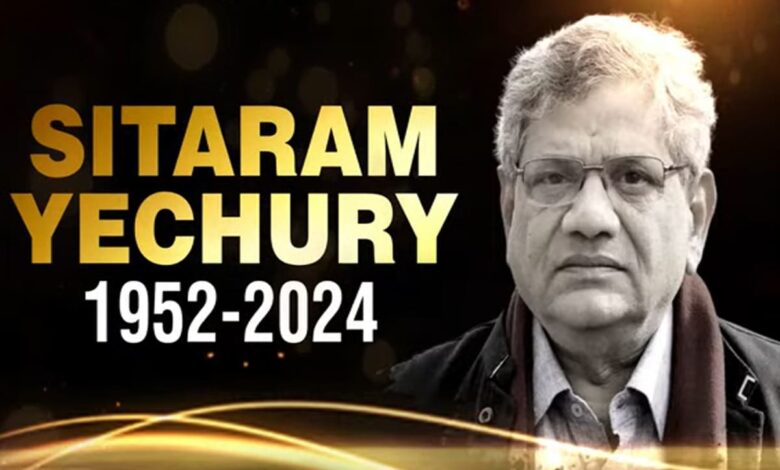
NAME: Sitaram Yechury
AGE: 72
Sitaram Yechury, the fifth general secretary of the CPM, died on September 12, 2024, after a prolonged illness. He was admitted for days at Delhi’s All-India Institute of Medical Sciences after he had contracted a lung infection. He was mourned by scores of friends from all walks of life and political leaders across party lines.
Prime Minister Narendra Modi remembered the comrade as a “leading light of the Left”. Leader of Opposition in the Lok Sabha and Congress leader Rahul Gandhi called him “a protector of the idea of India”.
QUALIFICATIONS
Sitaram Yechury, born in Chennai to a Telugu speaking family, had been a brilliant student, and achieved the all-India first rank in the Central Board of Secondary Education examinations. In 1973, he graduated with a first-class degree in Economics from Delhi’s St Stephen’s College.
For his Masters’ degree in Economics, he had enrolled at the Jawaharlal Nehru University (JNU), securing first-class honours again in 1975 and started working for his PhD. But his arrest during the Emergency prevented him from completing his degree.
POLITICAL JOURNEY
Sitaram Yechury’s association with Leftist thoughts go back to his student days in Jawaharlal Nehru University, where he was worked with the other key CPM leader, Prakash Karat, to build up a formidable Left bastion that still endures. Although an active member of the CPM’s student arm, the SFI (Students Federation Of India), his formal association with the party had started with his arrest.
In his early years, he was groomed by P Sundarayya and Harkishan Singh Surjeet. In 1984, he was elected the chief of SFI and was invited to the party’s Central Committee.
Four years later, he was elected to the party’s Central Secretariat in 1988 and to the Politburo in 1992 at the age of 40.
A three-time chief of the CPM, Yechury took over the reins of the party when Left fortunes were on the decline. He became the general secretary of the CPM at the 21st party Congress in Visakhapatnam on April 19, 2015, taking over from Prakash Karat at a time the party was down from 43 MPs in 2004 to nine in 2014. He was re-elected to the post in 2018, and 2022.
Yechury remained one of the most vocal critics of the Narendra Modi government and its liberal economic policies. During his 12-year tenure in the Rajya Sabha, he also became a powerful voice of the Opposition.
The former MP from Bengal also headed the party’s international department and was editor of the party organ “People’s Democracy” for two decades.
ACHIEVEMENTS
Over the last five decades, Yechury, a former Rajya Sabha MP from Bengal, left his imprint not just on the CPM but also the national political canvas — playing an active role in drawing up the Common Minimum Programme for the United Front government in 1996.
Much like his mentor Harkishen Singh Surjeet, Yechury was the go-to person when it came to coalition politics. Surjeet was a key player during the coalition era during the National Front government of VP Singh – formed in 1989 – and the United Front government of 1996-97. The CPM had lent outside support to both.
Yechury, who took over that baton, was the go-to man in the UPA years from 2004-2014. Poles apart from his predecessor Prakash Karat, known for his hardline positions, Sitaram Yechury thrived on the challenges of coalition politics. This was made easier by his pragmatic nature, and the gift of making friends across the political spectrum.
His command over as many as eight languages, including Hindi, Telugu, Tamil, Bangla and Malayalam made him the most acceptable mediator for the non-BJP parties over the last one-and-a-half decades – the exception being Mamata Banerjee’s Trinamool Congress.
He was known for his ability to keep personal connections despite political differences, and had friends even in the BJP camp. An amiable and an eclectic conversationalist, his friends said he could hold forth on film songs as much as politics and flit easily between conversations on caste to history and economics.
Sitaram Yechury, along with senior Congress leader P Chidambaram, had drafted the common minimum programme of the Left Front-backed first United Progressive Alliance (UPA) government in 2004.
In the run-up to this year’s Lok Sabha election, his alliance building skills worked again. CPM – which had refused to be in alliance with the Congress – became part of the Opposition INDIA bloc and Yechury remained one of its key faces.
CONTROVERSIES
In 1996, Sitaram Yechury had voted in favour of the CPM forming a multi-party coalition with former Bengal Chief Minister Jyoti Basu as the Prime Minister. But the motion was defeated, with the opponent group being led by Prakash Karat and the United Front government led by HD Deve Gowda came to power.
Ahead of the Indo-US nuclear deal too, the CPM Central Committee had rejected a proposal from Yechury that listed all the party’s objections with which the Congress was on board. The party, instead, went along with Prakash Karat’s suggestion to pull out support to the UPA government.
In 2015, Yechury had admitted that had the CPI-M withdrawn support from UPA-1 over public issues like jobs and income, it would have been acceptable to the people. But withdrawing support over the nuclear deal was something which the common people could not agree with. The party had to pay for it in 2009. Its seat count slid from 43 to 16, a drop of 27 seats.
At the state level, a seat sharing deal driven by him and Bengal Chief Minister Buddhadeb Bhattacharya in 2016 had backfired, leading to a drop in the party’s score from 40 to 26 seats. The Congress had gained two seats, going up from 40 to 42 of the state’s 292 assembly seats.
The same year, the Left-led LDA’s victory in Kerala over the Congress had given credence to Kerala leaders’ view that any alliance with the Congress was a risk to the party.
FAMILY
Yechury is survived by his wife, journalist Seema Chisti, the editor of The Wire, his daughter, Akhila, and son, Danish. In 2021, Yechury lost his eldest son, Ashish Yechury, to COVID-19.
(With agencies)




